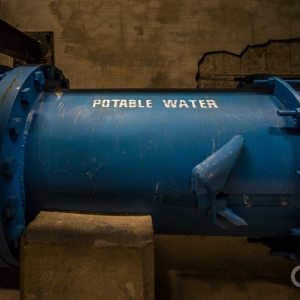Federal Water Tap, March 30: EPA Suspends Enforcement of Some Environmental Rules
The Rundown
Because of the coronavirus pandemic, the EPA says it will be flexible with industries on monitoring and reporting requirements. Federal agencies are cancelling or postponing public meetings because of the Covid-19 outbreak. EPA announces the dates for its annual drinking water workshop. And lastly, Congress heads home after passing a huge coronavirus relief package that did not include water sector assistance.
“Water and wastewater professionals are among the nation’s essential critical infrastructure workforce who remain on the job to help fight and bring an end to this pandemic. We simply ask Congress to recognize the needs of utilities and provide federal assistance to address ratepayer burdens and make utilities whole for doing their part to respond to the coronavirus pandemic.” — Letter from water utility trade groups to Congress, requesting financial aid in the next coronavirus relief bill.
By the Numbers
$1.5 million: Funding allocated to New Jersey to test faucets in schools and child care facilities for lead. The funding is part of $43 million that Congress appropriated to the states to test for lead in those water sources. (EPA)
News Briefs
EPA Relaxes Enforcement
The U.S. Environmental Protection Agency will relax enforcement of civil penalties for noncompliance with industrial air and water pollution laws during the coronavirus outbreak, the agency announced on Thursday.
Quarantines and illness may limit staff availability and cause a facility to violate the terms of its permits, wrote Susan Bodine, the EPA assistant administrator for enforcement and compliance assurance. That includes monitoring air emissions, sampling wastewater discharges, and filing reports.
The open-ended policy states that, in the water sector, continued operation of drinking water treatment is the highest priority. If there is a staff shortage, emphasis should be placed on monitoring water supplies for microbial pathogens, nitrate, and lead.
In deciding whether to seeking penalties for unlawful discharges, the agency will distinguish between unavoidable actions and those that are “an intentional disregard for the law.”
To be eligible for the exemption, facilities must document how the Covid-19 outbreak caused noncompliance and what efforts they made to comply with the law.
Environmental groups decried the policy. More than a dozen groups, including the Environmental Integrity Project, Environment Texas, and Potomac Riverkeeper Network, sent a letter to the agency objecting to a “blanket waiver” on noncompliance.
“We understand the coronavirus is a public health emergency that may require a flexible response from EPA,” the groups wrote. “That response must be tailored to specific and appropriate circumstances and not offer a blanket waiver of requirements that many companies that are up and running may have no trouble meeting.”
The temporary policy is retroactive to March 13, and does not apply to Superfund activities. The policy has no set end date.
Studies and Reports
Meetings Cancelled or Postponed
The need for physical distance to prevent the spread of the new coronavirus has resulted in numerous meetings being cancelled, postponed, or moved online.
The Army Corps of Engineers cancelled public meetings to provide updates on Missouri River basin reservoir levels and runoff. The meetings, which were scheduled for April 6 to 14, will likely be moved online, according to John Remus, chief of the Missouri basin water management division. Details will be available this week.
The Army Corps also postponed five public meetings to discuss its levee safety program. New dates for the virtual meetings have not been announced.
On the Radar
Congress on Break
The House and Senate have adjourned until April 20, but there will be more coronavirus business to attend to when they return.
There is some expectation that a fourth coronavirus relief bill will be on the table when representatives reconvene.
The first three bills did not include direct assistance for the water and wastewater sector, but industry leaders have notified Congress that aid may be necessary, especially if revenue declines.
Revenue might decline for two main reasons. Many utilities have said that they will not shut off water because of overdue bills during the outbreak, which could result in fewer timely payments. The rapid decline in economic activity could also reduce water use, and thus reduce revenue.
In context: $1.5 Billion for Water-Bill Assistance Inserted in House Democrats’ Coronavirus Aid Package
Lead Advisory Committee Meeting
The Lead Exposure and Prevention Advisory Committee will hold a public meeting on April 29.
To attend the web conference, registration is required by April 15.
Congress established the committee in 2016.
EPA Drinking Water Workshop
The EPA set the date for its annual drinking water workshop, which will focus on small water systems this year.
The workshop will be held September 1 to 3, in Covington, Kentucky.
Federal Water Tap is a weekly digest spotting trends in U.S. government water policy. To get more water news, follow Circle of Blue on Twitter and sign up for our newsletter.
Brett writes about agriculture, energy, infrastructure, and the politics and economics of water in the United States. He also writes the Federal Water Tap, Circle of Blue’s weekly digest of U.S. government water news. He is the winner of two Society of Environmental Journalists reporting awards, one of the top honors in American environmental journalism: first place for explanatory reporting for a series on septic system pollution in the United States(2016) and third place for beat reporting in a small market (2014). He received the Sierra Club’s Distinguished Service Award in 2018. Brett lives in Seattle, where he hikes the mountains and bakes pies. Contact Brett Walton






Leave a Reply
Want to join the discussion?Feel free to contribute!